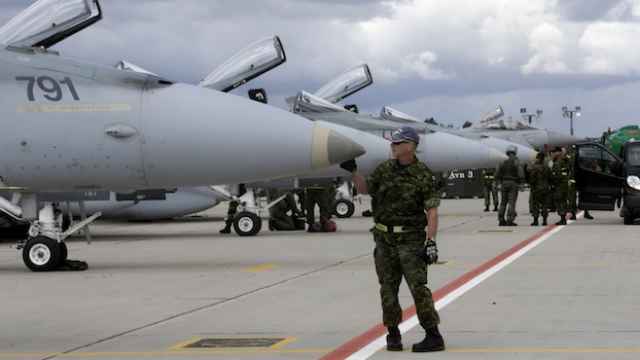Russia's top general said Tuesday that he would beef up combat capabilities this year in Crimea, the Arctic and the country's westernmost Kaliningrad region that borders two NATO states.
The remarks by General Valery Gerasimov, chief of the General Staff of the Armed Forces, are likely to deepen concern in the West over what it sees as Russia increasingly flexing its muscles since the start of the crisis in Ukraine.
NATO's top military commander, General Philip Breedlove, said Tuesday that the alliance was already looking at stepping up exercises in the Baltic Sea region in response to a rise in Russian military maneuvers there late last year.
"In 2015, the Defence Ministry will focus its efforts on increasing the combat capabilities of its units and increasing combat strength in accordance with the military development plans," Gerasimov told Russian journalists.
"Special attention will be given to the groups in Crimea, the Kaliningrad region and the Arctic," he was quoted as saying by Russian news agencies but gave no further details.
His remarks follow the adoption of a new military doctrine signed by President Vladimir Putin in December which underlines the need to protect Russia's interests in the Arctic and identifies NATO expansion as an external risk.
Any military build-up on NATO's doorstep in Kaliningrad, an exclave bordering Poland and Lithuania, would worry the Western alliance, while the Arctic's mineral riches and energy reserves ensure that territory there is contested by several nations.
Russia deployed 14 military jets to Crimea last November as part of a squadron of 30 that will be stationed there, making clear it intends to strengthen its presence on the peninsula since annexing it from Kiev last March.
Breedlove warned at the time that Russia's "militarization" of Crimea could be used to exert control over the Black Sea.
He said Tuesday that NATO was considering adapting a program of military exercises in the Baltic Sea region, where he said Russian activities had changed in character and showed capabilities not seen before.
"The first series of changes will not be an increase in number but they will be to group them together … to better prepare our forces and to allow nations to work together as a NATO force, but we are looking at increasing some exercises," he said at a NATO base at Szczecin in northwest Poland.
NATO has boosted its military presence in eastern Europe, saying it has evidence Russia orchestrated and armed the rebellion in eastern Ukraine last year that followed the overthrow of a Kremlin-backed president in Kiev.
Putin says Russia poses no threat to anyone and denies Russia has sent troops or weapons to back the separatists.
A Message from The Moscow Times:
Dear readers,
We are facing unprecedented challenges. Russia's Prosecutor General's Office has designated The Moscow Times as an "undesirable" organization, criminalizing our work and putting our staff at risk of prosecution. This follows our earlier unjust labeling as a "foreign agent."
These actions are direct attempts to silence independent journalism in Russia. The authorities claim our work "discredits the decisions of the Russian leadership." We see things differently: we strive to provide accurate, unbiased reporting on Russia.
We, the journalists of The Moscow Times, refuse to be silenced. But to continue our work, we need your help.
Your support, no matter how small, makes a world of difference. If you can, please support us monthly starting from just $2. It's quick to set up, and every contribution makes a significant impact.
By supporting The Moscow Times, you're defending open, independent journalism in the face of repression. Thank you for standing with us.
Remind me later.





